Menu:
News from the
Peter-Hesse-foundation
The beginning
who? – when? – how? – why?
New purpose
from 2013
Foundation photos
© Peter-Hesse-Foundation
Peter-Hesse-Foundation
VALUES + VISION
+ Dr. Rupert Sheldrake
Menu:
News from the
Peter-Hesse-foundation
The beginning
who? – when? – how? – why?
New purpose
from 2013
Foundation photos
© Peter-Hesse-Foundation
Peter-Hesse-Foundation
VALUES + VISION
+ Dr. Rupert Sheldrake
The Peter-Hesse-Foundation continued to support the budding Montessori community in the Ivory Coast. In 2008, the Foundation had funded the first Montessori school, with the goal of empowering cocoa growing households to increase educational opportunities, while reducing the prevalence of child labor on cocoa plantations. 23 teachers have been trained and 4 preschools have been started by the graduates.
In 2013 the Foundation purchased land for a permanent school which would improve the quality of education in the cocoa farming community and provided support to the pioneer schools.
The Montessori preschool in Abengourou, Ivory Coast, acquired a piece of land for the purpose of constructing a school. This will mean a permanent home for the Montessori preschool, started in 2008.
Financed by the Peter Hesse Foundation, the school started as an initiative to improve the quality of education in cocoa farming communities through early childhood education and teacher training.
So far, the school has been operating in rented premises. The school will continue to operate in rented premises until a school building is constructed (this will happen as funds permits). The land, however is a great start in making the school permanent. A permanent school will bring us closer to the goal of empowering cocoa households to increase educational opportunities, while reducing the prevalence of child labor on cocoa plantations.
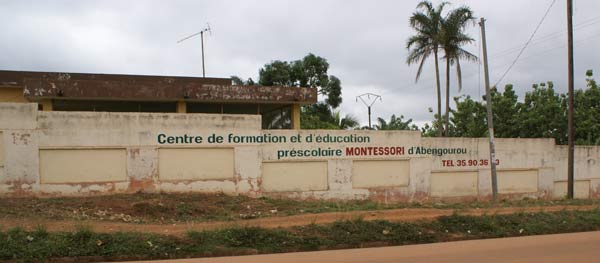
Extract of 4 chapters from VISION WORKS, 2008, by Peter Hesse
– (pages 315 to 325 in the book) – 6 pages PDF.
On the way to Africa
– containing these subtitles:
– Montessori – the trainable method
– Reaching for Africa and beyond
– Early learning – a basic solution
On Friday 4th May, 13 student teachers graduated the Montessori training course in Abengourou, Ivory Coast. This is the second promotion of teachers to persevere to the finish line in the war-torn country. A total of 23 teachers from both promotions are now the pioneers of the Montessori Method which emphasizes peace, and teaches children to work alongside each other in harmony. Qualities that would certainly be beneficial for the country. Although it is a small step in what is needed, three new pre-schools will open in the coming academic year by our graduates, one in Abengourou, one in Bouak – and another in Yamoussoukro.
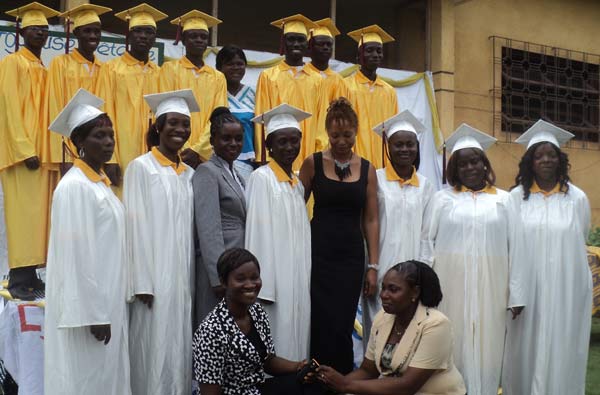
Photos from the first Montessori pre-school of the CENTRE MONTESSORI of the Ivory Coast of the Peter-Hesse-Foundation in Abengourou, Ivory Coast.
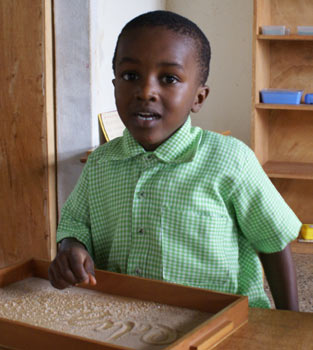
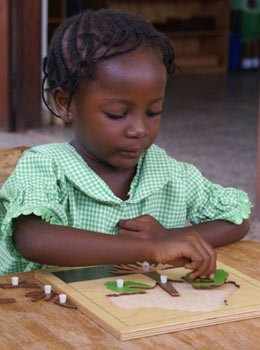
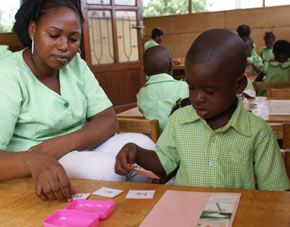
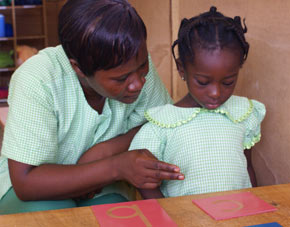
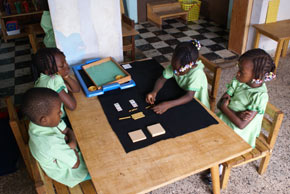
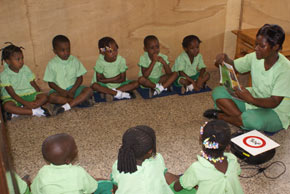
Carol Guy-James Barratt, the Foundation’s Montessori project-coordinator, will be in our Montessori teacher training center in Côte d’Ivoire from March 20 until the end of the March. She will be accompanied by Willande Dorlus-Antoine, one of our Haitian teachers. Willande will spend the next three months in the Ivory Coast, training the African students who are working towards their Montessori diplomas.
Before the earthquake Willande worked in the Montessori school in Kenskoff, Haiti. She also assisted in the teacher training center in the destroyed house in Rue Clermont, and attended Quisqueya University, pursuing a bachelor-degree in education – a study paid for by the Foundation. She has one year in which to complete her degree, after which time she would teach Montessori education courses at the University – as it was planned before the earthquake. These courses will be offered as a major in the education degree program at the University thus fulfilling the Foundation’s long-term strategy to reinforce Montessori teaching in Haiti – if the University will be repaired and reopened in a not too far future.
Problems in Haiti did not interfere with finalizing the first Montessori teacher-training in Côte d’Ivoire, West Africa in June 2010. The graduation ceremony took place on the 25th of June 2010 with great fanfare.
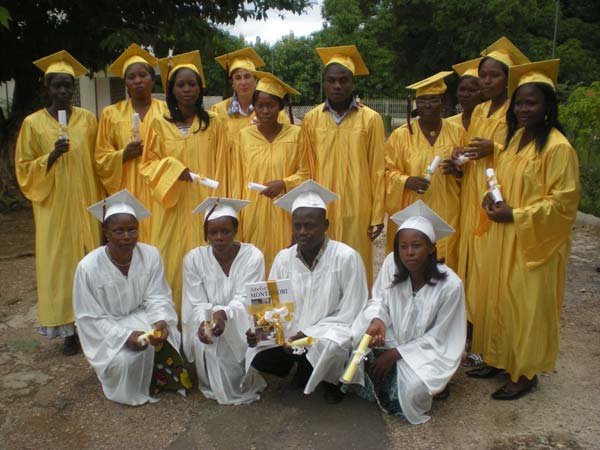
These teachers are the first to graduate from the „Centre Montessori d’Abengourou” in an initiative started by the Peter-Hesse-Foundation in 2008. The „Centre Montessori d’Abengourou” operates a model preschool where student-teachers can gain practical experience with children.
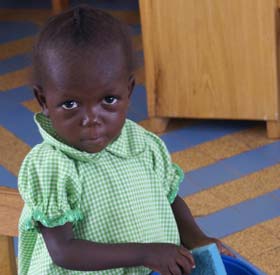
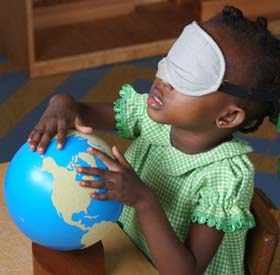
This preschool is also the first Montessori preschool in Ivory Coast. Next year the Foundation will open two preschools and will continue to open more schools as other teachers graduate the program – funds permitting. We use the photos of these two Montessori children for the first section pages in our renewed homepage. They may well have been from one of our Haiti project-schools.
A small step towards Primary School Education
The Centre Montessori d’Haiti is currently conducting a seminar over the course of three week-ends, to introduce Montessori preschool teachers to the math materials used at the primary level. For years parents have been asking “What do we do with our children when they finish preschool?” Although our intention is to eventually open primary schools, we have other pressing matters, such as completing the teacher training center as well as continuing support to the existing Montessori preschools. The current seminar is a small step towards making the primary school a reality by preparing teachers who can teach at that level. Conducting the seminar is Mrs Patricia Gwin from the USA.
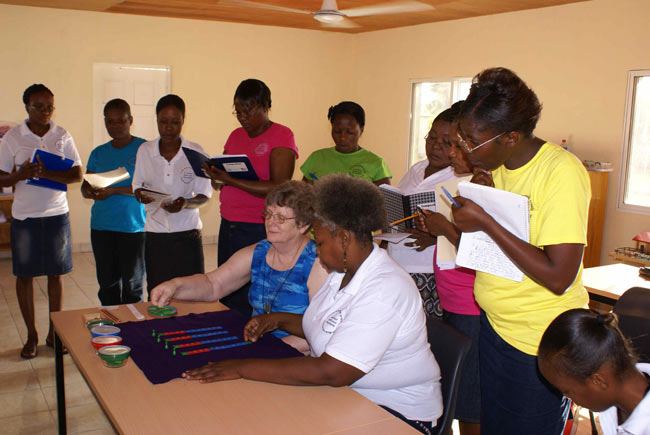
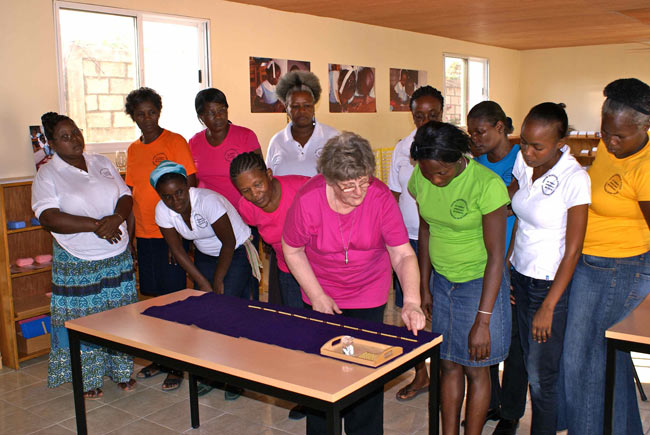
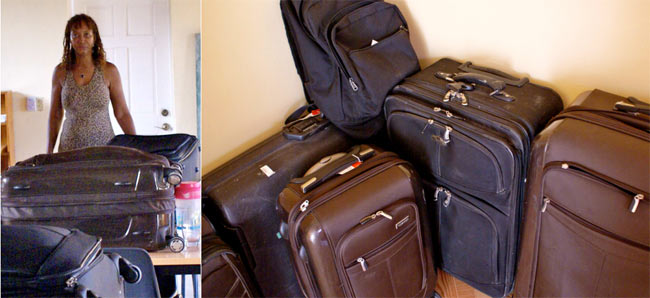
Arrived in Haiti on the 7th of April with 185 pounds of luggage filled with Montessori materials. I used my AAdvantage miles to purchase a business class ticket because it enabled me to bring 3 suitcases at 50lbs each and two pieces of hand luggage. So the only cost to the Foundation was US$110 to issue the ticket. I was glad the airlines did not weigh the hand luggage! The materials will be used to introduce the Primary school math materials, which is the next step up from pre-school math.
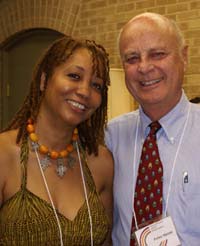 The Montessori teacher training and the resulting project-schools initiated by the Peter-Hesse-Foundationin, Haiti, is now a partner-project of Educateurs sans Frontières (EsF)®, (Montessori without Borders©), a division of the Association Montessori Internationale (AMI) that is dedicated to assisting children through the Montessori approach to education. – See: www.amiesf.org/action/haiti.htm. The Haiti-project was presented by Carol Guy-James Barratt and Peter Hesse (Photo) in the third EsF-congress in Dallas, Texas, in August 2011.
The Montessori teacher training and the resulting project-schools initiated by the Peter-Hesse-Foundationin, Haiti, is now a partner-project of Educateurs sans Frontières (EsF)®, (Montessori without Borders©), a division of the Association Montessori Internationale (AMI) that is dedicated to assisting children through the Montessori approach to education. – See: www.amiesf.org/action/haiti.htm. The Haiti-project was presented by Carol Guy-James Barratt and Peter Hesse (Photo) in the third EsF-congress in Dallas, Texas, in August 2011.
EsF is an organization of individuals who make a meaningful contribution to education by using the principles of Dr. Maria Montessori to help children achieve their full potential as members of society. Members of EsF are committed to working with each other, with communities, other organizations, governments, non-profits and a variety of partners to champion children’s education at home or abroad. Its members are people like you and me who want to make a difference and have a spirit of dedication, integrity and initiative to creating lasting change in the lives of children. EsF provides its members with the chance to change children’s lives by linking people with vast and varied experiences in helping children to flourish in all kinds of communities by applying Montessori principles.
EsF gives its members a chance to take their work to the next level by volunteering, getting support in starting an initiative, donating books or materials, by supporting a child in another country to go to school, or by supporting the training of a Montessori teacher, or by fund raising. EsF recognizes that no effort is too big or too small to contribute towards changing the lives of children for a better and more peaceful world. Educateurs sans Frontieres can help you to make your effort a reality. – http://www.amiesf.org/
Reaching children in less favorable situations in our ONE world in diversity would also help the realization of the six Dakar Education for All (EfA) goals – excepted by 164 countries in 2000:
GLOBAL COMMITMENT for child-centered Education for All: The Peter-Hesse-Foundation joins the Association Montessori Internationale (AMI) in the spirit of AMI’s “Educateurs sans Frontières (EsF)” – Teachers without Borders.
is not only a vision. It is a proven reality; it works in Haiti. There are not many more unsuitable and unfavorable framework conditions in the world than in Haiti. – But: why is Montessori Early Childhood Education in Haiti a successful model; why does it work?
The answer is relatively simple if you compare what happens in children’s minds in Montessori’s child-centered learning compared to the “traditional” teacher-centered didactics based on repetitive learning by heart of some more or less useful text: Maria Montessori’s conclusions after carefully observing children’s natural way to learn and act led to the individualization of children’s learning speed and learning path from concrete to abstract and obviously is also more joyful for the learning child.
Recent brain-research confirms, that human beings best remember what they learned in a passionate way, what their body, mind and soul absorbed in a holistic way – like in a gentle Montessori environment.
The “traditional” drill-style way to teach in Haiti like in other parts of the developing world is far less touching the child. Drill-style learning is, however not invented in the developing countries; it was imported from Europe – or more precise, from the time when in Prussia former military sergeants were given jobs to teach children. In a Montessori environment children are self-motivated to learn and to use their brain in a more creative way which is a precondition to find practical solutions in life when growing up – including to secure their own income.
This is a first but vital step to fight poverty. We have evidence of children from most simple illiterate family backgrounds in Haiti who have beautifully well developed their potentials up to academic levels. Of course, starting chances in life through qualified education is not the only precondition for success in life. There are political and social framework-conditions which are equally important to break the vicious poverty circle – but without early stimulation of a child’s natural learning mind, body and soul, there is much less chance.
Maria Montessori’s initiating work to improve education already one hundred years ago has today obtained multiple scientific backing by advanced human science, especially by recent brain research. Whether a child’s natural desire to learn is only a result of evolutionary natural development and/or whether there is also some ‘divine touch’ involved in this capacity of a growing human being may still be an unsolved mystery but it is unfortunately a fact that this natural capacity to learn is still a widely untapped treasure, a real potential, a possibility for human development in our ONE world in diversity.
In my early profession as a management trainer and consultant I have learned, it became evident in the teaching process through practical experience that adult learning to be a ‘better manager’ has significant parallels with Maria Montessori’s findings. Since I, of course, wanted to be successful in this new German post-war profession, I avoided simple lecturing in favor of practical playful exercise and group dynamics. Adults who, like children, are self-motivated to learn, are acquiring vital social skills from practice to cognitive understanding, not by dry theory. A manager may understand through reading or lecturing, for example, what goes wrong in one-way communication, how such one-way communication content gets twisted around. To really change such useless habits in favor of successful two-way exchanges is learned in playful games. Experience changes habits, not theory.
We are today at a tipping point of transforming our way to learn and to teach to solve multiple problems in our complex multi-cultural societies in making use of integral learning experience. This includes experiences in fighting poverty through holistic Montessori-style learning versus traditional cognitive transmission of dry theoretical knowledge. We can also wake-up and make use of our our creative instincts to fight poverty through better learning in a large scale reality. To promote change to appropriate framework conditions our elected leaders only need to open their minds to realize humanities learning potential for a peaceful more balanced world.
Even though cultural diversity, of course, influences the content of the newly re-discovered active learning potential of all human beings, practical learning already happens in many ways in our today’s fast changing reality. The skill to use electronic equipment by young children is one example. Rupert Sheldrake’s morphic fields seem to be involved in our cross-cultural reality. This may well speed up large-scale learning processes. The formal school systems, however, do not always follow the newly re-discovered learning potentials. It is time to change this now. A hundred years ago, Maria Montessori set the pace for this global challenge. Now, brain scientists come to comparable conclusions. This may help to reduce political skepticism. This should improve the willingness of educational politics to be part of the needed changing processes.
A strong supporting argument for accepting what Maria Montessori – and modern scientific brain research – found out leading to the need of child-centered processes in large-scale education is that it even works in most deprived situations in the world – like in Haiti.
Peter Hesse
Peter-Hesse-Foundation SOLIDARITY IN PARTNERSHIP for ONE world in diversity.
The budding Montessori community in the region of Abengourou, Ivory Coast has grown from a single school with 20 children to four schools and additionally trained teachers with over 300 children.
The foundation funded the first Montessori school in Abengourou in 2008, with the goal of empowering cocoa growing households to increase educational opportunities, while reducing the prevalence of child labour on cocoa plantations. The Foundation started training Montessori teachers and opened a Montessori preschool with 20 children where teachers could gain practical experience. Today the model school has grown from 20 children to several new promotions of qualified teachers, and three other schools opened by graduates have also increased their teacher and student numbers. The Montessori community in this region now boasts over 300 children from this growing network of schools. This initiative provides educational opportunities for these children that did not exist before. Our goal is to increase the number of trained Montessori teachers to continue to keep up the international standard of instruction.
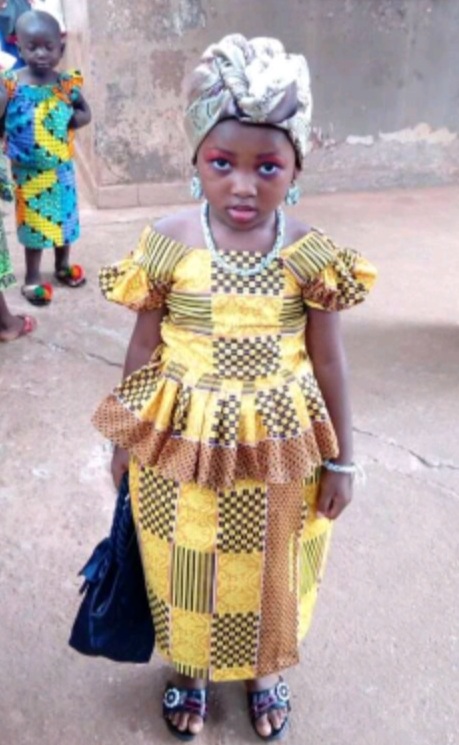
A small step towards Primary School Education
The Centre Montessori d’Haiti is currently conducting a seminar over the course of three week-ends, to introduce Montessori preschool teachers to the math materials used at the primary level. For years parents have been asking “What do we do with our children when they finish preschool?” Although our intention is to eventually open primary schools, we have other pressing matters, such as completing the teacher training center as well as continuing support to the existing Montessori preschools. The current seminar is a small step towards making the primary school a reality by preparing teachers who can teach at that level. Conducting the seminar is Mrs Patricia Gwin from the USA.



Arrived in Haiti on the 7th of April with 185 pounds of luggage filled with Montessori materials. I used my AAdvantage miles to purchase a business class ticket because it enabled me to bring 3 suitcases at 50lbs each and two pieces of hand luggage. So the only cost to the Foundation was US$110 to issue the ticket. I was glad the airlines did not weigh the hand luggage! The materials will be used to introduce the Primary school math materials, which is the next step up from pre-school math.
 The Montessori teacher training and the resulting project-schools initiated by the Peter-Hesse-Foundationin, Haiti, is now a partner-project of Educateurs sans Frontières (EsF)®, (Montessori without Borders©), a division of the Association Montessori Internationale (AMI) that is dedicated to assisting children through the Montessori approach to education. – See: www.amiesf.org/action/haiti.htm. The Haiti-project was presented by Carol Guy-James Barratt and Peter Hesse (Photo) in the third EsF-congress in Dallas, Texas, in August 2011.
The Montessori teacher training and the resulting project-schools initiated by the Peter-Hesse-Foundationin, Haiti, is now a partner-project of Educateurs sans Frontières (EsF)®, (Montessori without Borders©), a division of the Association Montessori Internationale (AMI) that is dedicated to assisting children through the Montessori approach to education. – See: www.amiesf.org/action/haiti.htm. The Haiti-project was presented by Carol Guy-James Barratt and Peter Hesse (Photo) in the third EsF-congress in Dallas, Texas, in August 2011.
EsF is an organization of individuals who make a meaningful contribution to education by using the principles of Dr. Maria Montessori to help children achieve their full potential as members of society. Members of EsF are committed to working with each other, with communities, other organizations, governments, non-profits and a variety of partners to champion children’s education at home or abroad. Its members are people like you and me who want to make a difference and have a spirit of dedication, integrity and initiative to creating lasting change in the lives of children. EsF provides its members with the chance to change children’s lives by linking people with vast and varied experiences in helping children to flourish in all kinds of communities by applying Montessori principles.
EsF gives its members a chance to take their work to the next level by volunteering, getting support in starting an initiative, donating books or materials, by supporting a child in another country to go to school, or by supporting the training of a Montessori teacher, or by fund raising. EsF recognizes that no effort is too big or too small to contribute towards changing the lives of children for a better and more peaceful world. Educateurs sans Frontieres can help you to make your effort a reality. – http://www.amiesf.org/
Reaching children in less favorable situations in our ONE world in diversity would also help the realization of the six Dakar Education for All (EfA) goals – excepted by 164 countries in 2000:
GLOBAL COMMITMENT for child-centered Education for All: The Peter-Hesse-Foundation joins the Association Montessori Internationale (AMI) in the spirit of AMI’s “Educateurs sans Frontières (EsF)” – Teachers without Borders.
is not only a vision. It is a proven reality; it works in Haiti. There are not many more unsuitable and unfavorable framework conditions in the world than in Haiti. – But: why is Montessori Early Childhood Education in Haiti a successful model; why does it work?
The answer is relatively simple if you compare what happens in children’s minds in Montessori’s child-centered learning compared to the “traditional” teacher-centered didactics based on repetitive learning by heart of some more or less useful text: Maria Montessori’s conclusions after carefully observing children’s natural way to learn and act led to the individualization of children’s learning speed and learning path from concrete to abstract and obviously is also more joyful for the learning child.
Recent brain-research confirms, that human beings best remember what they learned in a passionate way, what their body, mind and soul absorbed in a holistic way – like in a gentle Montessori environment.
The “traditional” drill-style way to teach in Haiti like in other parts of the developing world is far less touching the child. Drill-style learning is, however not invented in the developing countries; it was imported from Europe – or more precise, from the time when in Prussia former military sergeants were given jobs to teach children. In a Montessori environment children are self-motivated to learn and to use their brain in a more creative way which is a precondition to find practical solutions in life when growing up – including to secure their own income.
This is a first but vital step to fight poverty. We have evidence of children from most simple illiterate family backgrounds in Haiti who have beautifully well developed their potentials up to academic levels. Of course, starting chances in life through qualified education is not the only precondition for success in life. There are political and social framework-conditions which are equally important to break the vicious poverty circle – but without early stimulation of a child’s natural learning mind, body and soul, there is much less chance.
Maria Montessori’s initiating work to improve education already one hundred years ago has today obtained multiple scientific backing by advanced human science, especially by recent brain research. Whether a child’s natural desire to learn is only a result of evolutionary natural development and/or whether there is also some ‘divine touch’ involved in this capacity of a growing human being may still be an unsolved mystery but it is unfortunately a fact that this natural capacity to learn is still a widely untapped treasure, a real potential, a possibility for human development in our ONE world in diversity.
In my early profession as a management trainer and consultant I have learned, it became evident in the teaching process through practical experience that adult learning to be a ‘better manager’ has significant parallels with Maria Montessori’s findings. Since I, of course, wanted to be successful in this new German post-war profession, I avoided simple lecturing in favor of practical playful exercise and group dynamics. Adults who, like children, are self-motivated to learn, are acquiring vital social skills from practice to cognitive understanding, not by dry theory. A manager may understand through reading or lecturing, for example, what goes wrong in one-way communication, how such one-way communication content gets twisted around. To really change such useless habits in favor of successful two-way exchanges is learned in playful games. Experience changes habits, not theory.
We are today at a tipping point of transforming our way to learn and to teach to solve multiple problems in our complex multi-cultural societies in making use of integral learning experience. This includes experiences in fighting poverty through holistic Montessori-style learning versus traditional cognitive transmission of dry theoretical knowledge. We can also wake-up and make use of our our creative instincts to fight poverty through better learning in a large scale reality. To promote change to appropriate framework conditions our elected leaders only need to open their minds to realize humanities learning potential for a peaceful more balanced world.
Even though cultural diversity, of course, influences the content of the newly re-discovered active learning potential of all human beings, practical learning already happens in many ways in our today’s fast changing reality. The skill to use electronic equipment by young children is one example. Rupert Sheldrake’s morphic fields seem to be involved in our cross-cultural reality. This may well speed up large-scale learning processes. The formal school systems, however, do not always follow the newly re-discovered learning potentials. It is time to change this now. A hundred years ago, Maria Montessori set the pace for this global challenge. Now, brain scientists come to comparable conclusions. This may help to reduce political skepticism. This should improve the willingness of educational politics to be part of the needed changing processes.
A strong supporting argument for accepting what Maria Montessori – and modern scientific brain research – found out leading to the need of child-centered processes in large-scale education is that it even works in most deprived situations in the world – like in Haiti.
Peter Hesse
Peter-Hesse-Foundation SOLIDARITY IN PARTNERSHIP for ONE world in diversity.
Peter-Hesse-Foundation, Düsseldorf
in Bürogemeinschaft mit
W. P. Schmitz-Stiftungen
Volmerswerther Str. 86
D-40221 Düsseldorf
Tel: +49 (0)211-39-83-770
E-Mail: p.hesse@solidarity.org